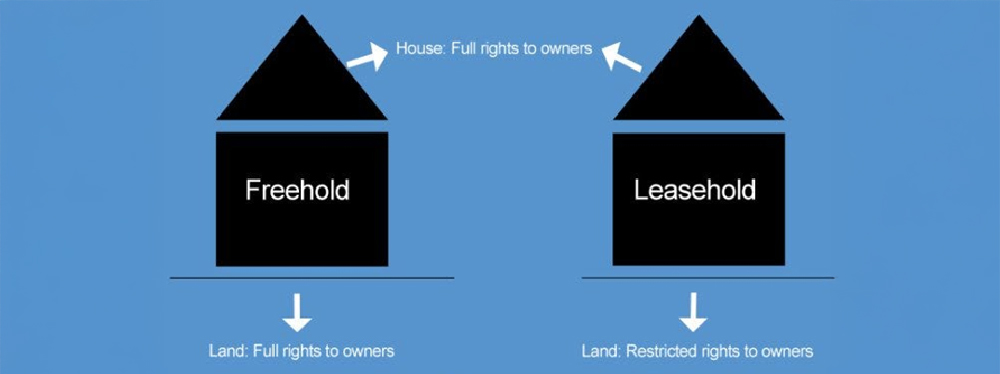If you have ever tried to understand Indian real estate, you must have come across the terms of freehold and leasehold properties. Comprehending property ownership structures without making any investment decisions is essential, especially if you are a NRI.
Indian properties are split into leasehold and freehold categories which bring separate financial conditions and legal aspects in the country. NRIs must understand this distinction as it affects their investment stability, market value and legal position.
This blog post provides a simple explanation of leasehold and freehold property types, along with key factors to consider before making a decision.
What is Freehold Property?
Real estate possessing freehold status allows its owner to hold permanent rights without lease limitations or time constraints. The owner has the complete ownership of the land and the building.
Freehold property holders possess unrestricted permission to freely sell their assets or make property modifications without obtaining permission from any authorities.
Key Benefits of Freehold Property
- The land ownership rights extend to complete control of both land and structure belonging to the buyer.
- Permanent ownership exists in freehold properties since they eliminate the process of lease renewal, which leasehold properties require.
- Freehold properties gain a better market value while showing high affordability for buyers and easy-to-sell or secure mortgages.
Popular Freehold Property Locations in India
Many prime Indian locations have freehold property markets that draw both residents and Non-Resident Indians. Residential and commercial freehold properties can be found throughout Delhi, Mumbai, Bengaluru, Pune and Chennai. The emerging markets of Hyderabad, Noida and Gurgaon attract investors because they offer developed infrastructure and investment potential.
Freehold properties are a safe and lucrative option for NRIs looking to invest in Indian real estate as it ensures long-term financial security and growth.
Read Also: Investing in Real Estate Development Projects in India: A Guide for NRIs
What is Leasehold Property?
People who opt for leasehold property gain ownership for a specific period while the land remains under the control of the state or a private entity. Most leasehold agreements range from 30 to 99 years, with the option for renewal upon expiration.
The usage rights of a leasehold property are valid only until the lease period ends, whereas freehold property grants permanent ownership.
Benefits of Leasehold Property
- Leasehold property ownership provides lower financial barriers to entering the real estate world when compared to freehold because investors and homebuyers can purchase them with limited cash on hand.
- The landowner, together with government authorities, bears principal responsibility for site maintenance and infrastructure upkeep, which lowers maintenance requirements for leaseholders.
Popular Leasehold Property Locations in India
The desired leasehold property markets include Delhi, Mumbai, Noida, Gurgaon and Navi Mumbai. The locations in these areas benefit from effective infrastructure and excellent connectivity standards combined with large investment opportunities, enabling NRIs and investors to use leasehold properties successfully.
NRIs who seek reasonable real estate investments in India should consider leasehold properties for their needs, particularly in areas experiencing high demand.
Comparative Analysis: Leasehold vs Freehold Property
Investors who want to put their money into Indian real estate need to know the fundamental distinctions between leasehold and freehold ownership:
| Comparison Factor | Freehold Property | Leasehold Property |
| Period of Owner Possession | Freehold property provides complete ownership rights to both the land and the building, which extends forever. | The ownership period of leasehold properties stretches to 99 years yet the property remains under the control of both parties for this duration until the landowner resumes ownership power. |
| Ease of Transferability and Resale Value | Freehold properties provide superior prospects regarding transferability and property resale values.
These properties have an increased transferability because they can be easily sold by the owner’s will and their extended lifetime ownership attracts more buyers in the market. |
Leasehold properties encounter difficulties in resale because potential buyers usually doubt the restricted tenure duration that influences the property market value. |
| Legal Aspects | Freehold properties have simpler owner rights. So, the acquisition of freehold properties by NRIs becomes simpler since they can secure better financing options. | Leasehold ownership can lead to challenges regarding lease renewals, land property rules and lease term adjustments.
As NRIs reside outside the country, they might find this process cumbersome. |
Factors to Consider When Choosing Between Leasehold and Freehold Property
A combination of factors must be assessed when NRIs decide to invest in Indian residential properties, ensuring alignment with their financial goals and long-term life plans.
- Short-term and Long-term Investment Goals:
The decision between leasehold and freehold properties should depend on whether you need long-term capital growth and stability because you will obtain superior results through freehold properties. Freehold properties grant permanent ownership to investors who need their assets to develop over time without lease expiration concerns.
Leasehold properties serve as appropriate investment tools for quick-term objectives because their time ownership remains limited. The limited ownership duration of leasehold properties reduces their potential for extended growth although they benefit short-term investors with reduced initial purchase costs.
- Fund Availability:
The choice heavily depends on what funds one has available before investing. Freehold properties need greater investment at the initial level since their perpetual ownership provides no end date for ownership control. Limited investment funds present an obstacle for some buyers to acquire property, especially those NRIs who need to watch their budget.
People interested in leasehold properties generally pay less for the purchase since they gain ownership rights only for a limited period. Also, it’s important to understand the renewal expenses together with the resale value depreciation.
- Legal and Regulatory Considerations:
NRIs must understand the laws and regulations which govern property ownership throughout India. The ownership rights under freehold properties remain straightforward, but leasehold properties require detailed agreements about renewal conditions and land-specific rules. For example:
- Lease Renewal Charges: In Delhi, leasehold property owners must pay a conversion fee to the Delhi Development Authority (DDA) to extend their lease beyond the original term.
- Transfer Restrictions: In Noida, leasehold property owners need prior approval from the local development authority before selling or transferring ownership.
Professional legal advice should be sought before investing in real estate as such advice ensures correct compliance with Indian property regulations to prevent potential complications.
Read Also: How Interest Rates Impact High-Value Real Estate Investments for NRIs?
Which Option is Right for NRI Investors
The decision between freehold or leasehold property ownership by NRIs depends on their specific financial conditions as well as their investment targets. Freehold properties would appeal to investors owning substantial funds who seek unchanging ownership and prefer to buy property in India for both present and future settlement purposes. Such NRIs are the ones who are looking for significant long-term growth in their capital base.
Leasehold properties are ideal for NRIs seeking short-term investments or those with limited financial resources. This property type is suitable for individuals looking to generate rental income while maintaining home ownership.
Conclusion
NRIs who want to invest in India must know the distinct features between leasehold and freehold properties as an essential part of their decision-making process. Freehold properties enable investors to possess the land permanently alongside higher property value, while leasehold properties suit investors who need quick, short-term ownership benefits.
NRIs should consider investing in Rustomjee’s residential properties for exceptional quality and secure long-term returns in India’s thriving real estate market.
FAQs
- What are the legal implications of owning a leasehold property?
NRIs who acquire leasehold properties must comprehend all lease agreement terms, especially renewal conditions and any property restrictions. After the lease period ends, the property will go back to being owned by the landowner thus affecting its value for the future.
- How does property financing differ for NRIs when purchasing leasehold versus freehold real estate in India?
Financing for NRIs differs based on property type. Banks and financial institutions are more willing to offer home loans for freehold properties due to their higher resale value and clear ownership rights.
Leasehold properties, especially with shorter lease terms, may have limited loan options, higher interest rates, or require additional approvals from local authorities.
- How to convert leasehold property to freehold?
Property owners who acquire leasehold properties can apply for conversion and negotiate the prices with the original owner to buy the current property. One has to gather the required documents to prove their ownership and pay the conversion fee to the concerned authorities.







